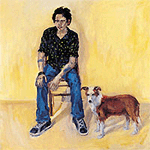 |
 |
|
|
|
| |||
 Papa M
Papa MWhatever, Mortal [Drag City; 2001] Rating: 8.6 Contrary to popular wisdom, you can teach an old dog new tricks. The real problem arises when the old dog becomes so wrapped up in his new tricks that he forgets all the old ones. The miserable thing winds up spending so much time showing off its incredible new talent that it forgets to do the simple things-- like eat out of a bowl and not shit on the rug. Hopeless and frustrated, you find yourself with no choice but to take a rusty kitchen knife to Fido, ending both his misery and yours. After hearing Papa M's Sings EP earlier this year, I couldn't shake the fear that I would at some point find myself cleaning David Pajo's diced innards off of my living room floor. After spending years with sonic adventurers like Slint and Tortoise, and working with such unique voices as Will Oldham, Pajo happened upon the miraculous discovery that he can play dusty old folk music. Unfortunately, those old blues and country records seemed to have wiped clean all that Pajo had learned in his travels, leaving him sounding painfully amateurish for a guy who wanted to sound like a weathered wanderer. He was an old dog trying to learn an older trick, and I for one feared that it would be his last. Thankfully, it appears that I won't be gutting David Pajo with a crowbar any time soon. Whatever, Mortal is a wonderful synthesis of Pajo's old and new tricks, and one of those rare albums that manages to be seriously steeped in tradition without being trite and boring. In some ways, Whatever, Mortal picks up where Sings left off: with Pajo trying his hand at some roots music, and putting his uncertain baritone to good use. But whereas Sings seemed little more than a genre exercise, Whatever, Mortal sees Pajo beginning to develop his own distinctive sound-- a kind of slapped-together orchestral feel that lends the album a beautifully downcast grandiosity. With Pajo, Tara Jane O'Neil, and Will Oldham covering a variety of instruments, ranging from guitars and melodicas to wood floors and dog tags, Whatever, Mortal is a magnificently rich-sounding album. Whereas lesser artists might get carried away with such vast instrumentation, Pajo keeps this album beautifully thin and airy. Take, for example, the album's opener, "Over Jordan," in which Pajo's voice is often accompanied by little more than guitar and banjo. The cold, dark tone of the song's verse is contrasted by its gorgeous "I'm going hoooooome" chorus, in which Pajo's multitracked voice seems to melt into something beautifully malleable. What could have been the album's most sparse, revealing moment comes with "Sorrow Reigns," a brief song in which Pajo is accompanied only by his acoustic guitar. But one of Whatever, Mortal's strengths is that, while parts of it are deeply affecting, the album never takes itself seriously. And on "Sorrow Reigns," Pajo makes this abundantly clear, letting loose the Oldham-esque lyric, "There was something like a wall between us/ That stopped your going down on my penis." There's a serious tradeoff here-- the break in the album's somewhat-serious fašade (which is already cracked by the album's title) is welcome, but the lyric sounds painfully out-of-place, and frankly, kind of dumb. A better executed bit of goofing off comes with the album's next track, "Krusty," a lovely instrumental set over the backdrop of an episode of "The Simpsons" (Episode #9F13, "I Love Lisa," for those of you who still find the phrase "worst episode ever" amusing.) Here, Pajo shows that, while he may be pursuing a folkier side, he still has some great guitar-based instrumental music in him. "Krusty" is immediately followed up by Whatever, Mortal's strongest track, "The Lass of Roch Royal," in which Pajo manages to bring great sonic ingenuity to musical and lyrical themes that have been around for centuries. Using some wonderfully placed ethereal background vocals, a sample of rain, and what could either be keys or the aforementioned dog tags, Pajo constructs a sonic approximation of spooky sorrow that seems infinitely more substantial than just an acoustic guitar and voice. So it seems that David Pajo hasn't lost his way after all. Quite the contrary, in fact; he's managed to produce his best album yet. By not strictly adhering to the various molds of old-time folk, blues, and country, Pajo has captured the essence of the music he once shallowly emulated. What's more, he's managed to turn it into something that's unquestionably his own. Good Pajo. -Matt LeMay, November 30th, 2001
|
|||

